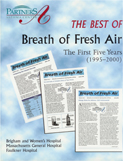Breath of Fresh Air: Feature Articles
Chapter 30: Cigarette Smoking and Asthma
There is little good that can be said about cigarette smoking. It is pleasurable for some people, helps to curb appetite, and relieves the addictive need for another cigarette. On the negative side, the list of harmful effects is long, including emphysema and chronic bronchitis; lung, throat, and bladder cancers; heart attacks and strokes; skin wrinkles; and more frequent respiratory tract infections. In addition, a pregnant woman who smokes cigarettes does harm not only to herself but also to her unborn child: the unborn child grows less in the womb, complications of labor and delivery are more common, and low-birth weight infants are more prone to a variety of medical problems. |
Cigarette smoking contributes to 444,000 preventable deaths each year in the United States. |
|
|
Each year in the United States, cigarette smoking contributes to approximately 440,000 preventable deaths. The recent multibillion dollar lawsuits and settlements against tobacco companies speaks to the huge economic cost of cigarette smoking to our health. Cigarette smoking has special meaning for persons with asthma. In asthma, allergic inflammation of the bronchial tubes causes mucus production, leading to cough and phlegm. In long-term cigarette smokers, chronic inhalation of smoke from burning tobacco leaves also stimulates the mucous glands in the bronchial tubes to make excess mucus, giving rise to daily cough with phlegm. |
"Double Jeopardy": Asthma and
Cigarette Smoking The bronchial tubes are a target of both asthma and cigarette smoke. |
|
|
In asthma, spasm of the muscles surrounding the bronchial tubes and swelling of those tubes makes breathing difficult. Some cigarette smokers develop irreversible narrowing of their bronchial tubes from inflammation and scarring, causing permanent breathing problems. Persons with asthma who smoke cigarettes are in "double jeopardy": they risk episodes of breathing difficulty due to asthma on top of everyday shortness of breath from the cigarette smoke-induced lung diseases, emphysema and chronic bronchitis. Of interest, most adults who experience the new onset of asthma after age 50 have a past history of cigarette smoking. |
Nearly one quarter of adult Americans continue to smoke. | |
|
Although health campaigns, cigarette taxes, and no smoking policies have had a major impact in reducing the number of current cigarette smokers in this country, approximately 25% of the adult population continue to be active smokers (down from 40% in the 1960s). With many millions of Americans still smoking cigarettes, it can be difficult for persons with asthma to avoid second-hand cigarette smoke exposure (also called passive smoking or environmental tobacco smoke exposure). Breathing the smoke from other persons' cigarettes can be troublesome if you have asthma. It can cause cough and wheeze and temporary worsening of your breathing. Having asthma means having air passageways in your lungs that are extra-sensitive to irritants in the air that you breathe, including second-hand smoke. The relation between asthma and second-hand smoke exposure is more complex than a temporary irritation to sensitive airways. Second-hand smoke exposure in the home can contribute to a child's developing asthma in the first place. Children of parents who smoke cigarettes are more likely to develop asthma than children of parents who do not smoke. In addition, parental smoking leads to worse asthma control in their asthmatic children. In a recently reported scientific study of asthmatic children, asthmatic symptoms lessened dramatically in the group of children whose cigarette-smoking parents agreed not to smoke in the home compared to those whose parents continued their pattern of cigarette smoking without change. |
Second-hand smoke exposure predisposes to new-onset asthma, more frequent respiratory infections, and more troublesome asthmatic symptoms. | |
|
It is difficult to overestimate the power of the smoking addiction. Its physical and emotional grip is enormous, comparable, the Surgeon General has said, to heroin addiction. Nonetheless, smoking cessation is possible, as proven by millions of former smokers. Smoking cessation aids include nicotine replacement (in the form of skin patches, gum, nasal spray, or a cigarette-like inhalational device) and a prescription medication (bupropion, marketed as Wellbutrin® or Zyban®) that helps to blunt the craving for cigarettes. Smoking cessation counselling programs are available at numerous sites around New England, including a program at the Massachusetts General Hospital (telephone: 617-726-7443) and one at the Brigham and Women's Hospital. If you help someone you know to quit smoking, you will likely help persons with asthma too. |
For cigarette smokers who want to quit, help
is available. You can find Smoking Sessation Programs at the Massachusetts General Hospital [(617) 726-7443] and at the Brigham and Women's Hospital [(617) 732-8983]. |
|
Smoking Facts(from an Official Statement of the American Thoracic Society, 1995)
|
||

